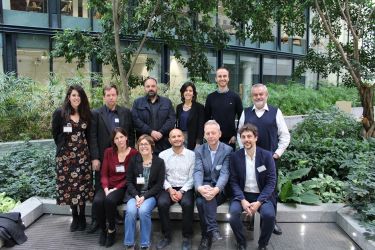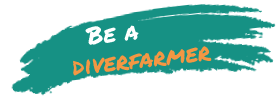The team coordinating the crop diversification project takes stock of its first year and a half of life in Brussels
After 18 months of work in the field of crop diversification and the search for sustainable agriculture, the coordination of the European Diverfarming project, led by the Universidad Politécnica de Cartagena and financed by the Horizon 2020 programme, has defended its advances to the European Commission.
 On the 13th February 2019, the people in charge of leading each of the 10 work packages the project comprises presented the work they carried out from when the project began on 1st May 2018 to 31st October 2018, to a tribunal presided by the person in charge of guiding the project from the European Commission (Police Officer) and made up by two more evaluators.
On the 13th February 2019, the people in charge of leading each of the 10 work packages the project comprises presented the work they carried out from when the project began on 1st May 2018 to 31st October 2018, to a tribunal presided by the person in charge of guiding the project from the European Commission (Police Officer) and made up by two more evaluators.
The project’s coordinator, Raúl Zornoza highlighted the work carried out by the team regarding meeting deadlines and the correct direction that the project is taking to achieve the objectives laid out.
Following the general overview offered by the project’s coordinator, the different leaders showed the steps taken in this period, mixing the experiences of those work packages which have already finished their tasks, with those which start now and those which continue in a transversal manner throughout the whole project. In this way, Javier Calatrava, form the Universidad Politécnica de Cartagena was able to show the work undertaken within work package number 2, coordinated by María Dolores Gomez and which finished in February 2018. This work was an essential basis for establishing the cases studies, since its main labour consisted in researching on crop diversification by means of a literature search and surveys carried out on the interested parties: farmers, agricultural associations and technical personnel. The catalogue of diversification alternatives posed by this team served to close their work.
In contrast to these work packages that set the basis for diversification, work package 9 led by Barbara Pancino from the University of Tucsia (Italy) began to work in these months with the intention of offering the necessary basis to those who put European agricultural policies into practice, aiming to convert crop diversification into an option that is present in such policies.
For their part, the leader of the communication and coordination team from the Unidad de Cultura Científica y de la Innovación at the University of Cordoba presented the action lines upon which the communication strategy is founded, and that will be in force until the end of the project in order to disseminate the benefits of crop diversification at all levels: agricultural sector, society, and public administrations.
Finally, the Diverfarming team will share, together with the DiverImpacts project, a joint session of exchange between researchers and technicians in agrarian policies from the European Union with the intention of building bridges between research and the management of public policies in the sector.
Diverfarming is a project financed by the Horizon 2020 Programme of the European Commission, within the challenge of “Food Security, Sustainable Agriculture and Forestry, Marine, Maritime and Inland Water Research and the Bioeconomy”, which counts on the participation of the Universities of Cartagena and Córdoba (Spain), Tuscia (Italy), Exeter and Portsmouth (United Kingdom), Wageningen (Netherlands), Trier (Germany), Pecs (Hungary) and ETH Zurich (Switzerland), the research centres Consiglio per la ricerca in agricoltura e l'analisi dell'economia agraria (Italy), the Consejo Superior de Investigaciones Científicas (Spain) and the Natural Resources Institute LUKE (Finland), the agrarian organisation ASAJA, and the companies Casalasco and Barilla (Italy), Arento, Disfrimur Logística and Industrias David (Spain), Nieuw Bromo Van Tilburg and Ekoboerdeij de Lingehof (Netherlands), Weingut Dr. Frey (Germany), Nedel-Market KFT and Gere (Hungary) and Paavolan Kotijuustola and Polven Juustola (Finland)).










